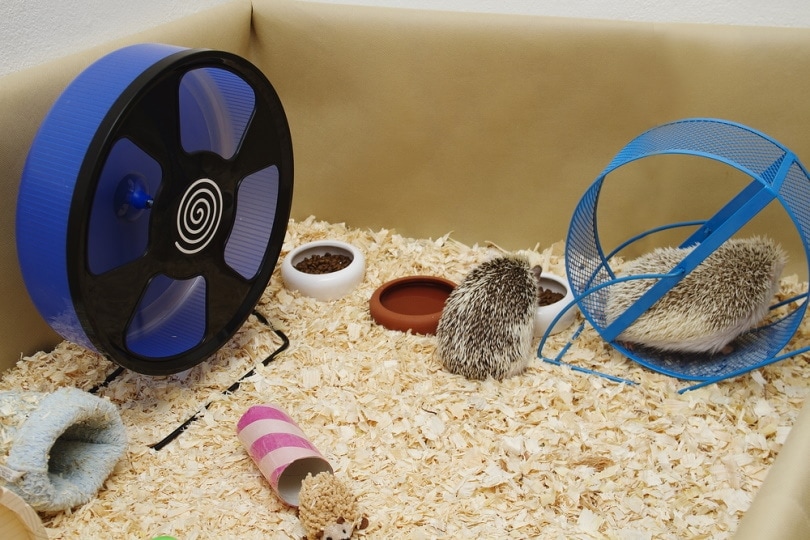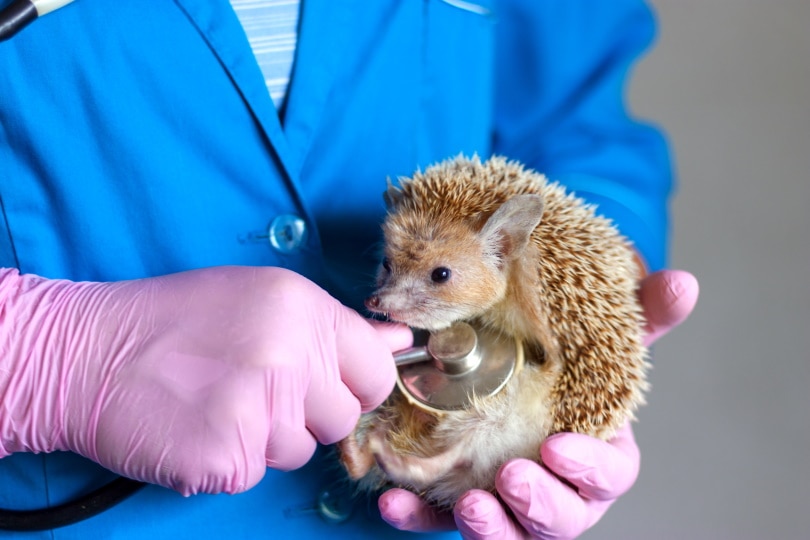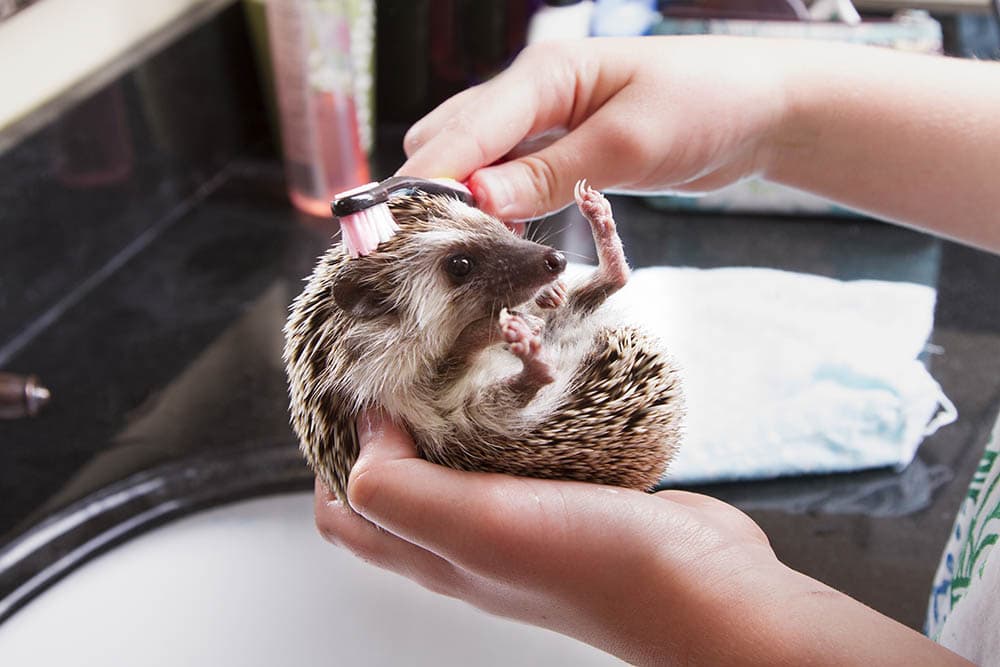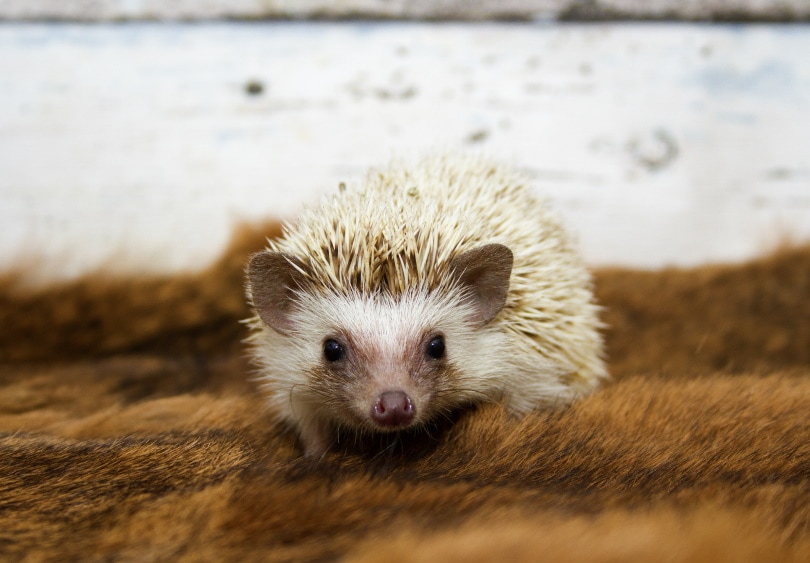
Hedgehogs have a questionable reputation for being lazy. You might have a hedgehog that is always asleep or always wanting to sleep. If this is your first time owning a hedgehog, this might be a little concerning. But don’t worry! Hedgehogs have unusual sleeping patterns. In fact, they can sleep up to 18 hours a day!
As much as hedgehogs sleep, there are some abnormal behaviors you want to look for to ensure your hedgehog is living its best life. It’s hard to notice these abnormalities at first, especially as a new hedgehog parent. But we’re here to help!
Keep reading to learn more about hedgehog sleep patterns and what you can do to help your hedgie sleep safe and sound.
Hedgehog Sleeping Habits
Hedgehogs are nocturnal creatures, meaning they sleep all day and are awake all night. They’re only awake for about 6 to 8 hours before scurrying back to their nest and sleeping. In the wild, hedgehogs spend the time they’re awake scavenging for food, making new nests, and searching for mates.
Hedgehogs sleep between 12 to 14 hours per day, sometimes more and sometimes less. It depends on the season. If it’s cold outside or in the room where your hedgehog lives, you might find your hedgehog sleeping up to 18 hours per day. Likewise, hot temperatures may signal your hedgehog to sleep less.
Baby hedgehogs sleep just as much and may even sleep more if they’re six months old or younger. They love their sleep!
It might seem excessive, but hedgehogs have their reasons for sleeping all day. It’s not just a way to pass the time, although that’s a good reason!

Where Do Hedgehogs Sleep?
Where hedgehogs sleep is just as important as when they sleep to protect them from predators. Even domesticated hedgehogs listen to this protective instinct and base their sleeping area on this instinct. Common hedgehog predators in the wild are foxes, large birds, dogs, cats, and other carnivorous animals. Hedgehogs build their nests to protect them from these predators.
What’s interesting about hedgehogs is that they’re not very territorial and sleep in different places almost every night. This is usually because they’re foraging, but it could be so that they don’t attract predators.
Wherever they choose to sleep, odds are it will be some form of hideaway. Hedgehogs love sleeping in areas with dense plant covers like hedges, trees, underbrush, and gardens.
A proper hiding place is essential for a good day’s rest for your hedgie. Ideally, the hiding place should be 3 x 4 inches. Anything bigger, and your hedgehog may feel vulnerable. It’s good to offer various bedding options for your hedgehog since they love to mix it up.
Related Read: Why Do Hedgehogs Burrow? 5 Possible Reasons

How Do Hedgehogs Sleep?
Hedgehogs like to sleep curled in a ball. It’s a natural protective instinct. Hedgehogs need to protect their midline in the wild since this area has no quills.
It’s best to leave your hedgehog alone when it sleeps, especially if it’s a new pet. Sometimes new hedgehog owners want to wake their hedgehog up for a cuddle session or playtime in the middle of the day. Remember that hedgehogs are prey animals, so if they’re disturbed suddenly, they’ll retreat into a ball and may deem you as a threat.
If your hedgehog sleeps on its back with its stomach out, congratulations! That’s the hedgehog way of saying it loves you. Normally, prey animals don’t sleep with their midline exposed. But if they’re in a comfortable environment, they’ll enjoy a nice back nap.
Hedgehogs are typically quiet sleepers. But every animal has unique quirks. You might get a squeak every now and then, depending on what your prickly pet is dreaming about.

Common Hedgehog Sleeping Problems
We understand that hedgehogs enjoy their slumber. Not only this, but they need a great sleep schedule to function normally. But how do you know if you’re sleepy hedgehog is sleeping well? There are a few abnormalities you can watch out for.
Blocked entrance
A common issue some hedgie owners should watch for is a blocked entrance to the hideaway. Sometimes owners like to move things around in the enclosure to keep the space fresh and new. Other times things are knocked over, especially after cleaning the pen. Hedgehogs won’t sleep in the open, so if the access to its safe place is blocked, this will throw off its sleep schedule.
Luckily, this is an easy fix. Move some items around and ensure your hedgehog has access to everything, including food and water.
Temperature and Light
Hedgehogs are sensitive to seasonal changes. Temperature fluctuations will signal your pet to sleep depending on if it’s cold or warm. As a hedgehog owner, you should know the exact temperature of your hedgehog’s cage. Watch out for fans, heaters, or vents near our hedgehog’s pen. Cold temperatures can cause hibernation, so ensure temperatures are consistent.
Hedgehogs need around 12 to 14 hours of light to satisfy their sleep schedule. This can be done naturally or artificially. If you have a light on constantly, this will throw off your hedgehog’s sleep schedule and cause it to sleep more. Likewise, if your hedgehog is in a dark space, it will sleep less, which could be bad for your hedgehog.

Territory issues
Hedgehogs usually aren’t territorial and prefer to be left alone. However, outside influences can affect how your hedgehog sleeps. You might have a dog or cat bothering the hedgehog, so it doesn’t feel safe.
Sometimes a second hedgehog can drive out the other one from the hideaway. Every hedgehog is different, so this isn’t always the case. If you have two hedgehogs, keep an eye on them and offer a second hideaway if needed. You might even need a second enclosure.
Enclosures
Check that your hedgehog has plenty of space to roam and play. In the wild, hedgehogs can travel far distances in one night. Some hedgehogs in Europe can travel 3 to 4 km! Your hedgie should have enough room for an eating area, a wheel, a hideaway, and a litter box. Ideally, your hedgehog should have about 4 square feet to roam about.
It’s essential that your hedgehog has the right bedding and feels comfortable in its enclosure as well. Check that the pen is clean and well-ventilated.

Mites
Something all hedgehog owners should watch for is mites. Mites are tiny parasites that bite and cause irritation to your hedgehog’s skin. Like fleas, mites in hedgehogs are itchy and can disrupt your hedgehog’s sleep schedule. Hedgehogs of any age and breed can get mites. They usually stem from a contaminated cage or another hedgehog.
Luckily, mites are relatively easy to treat. But you want to treat them as soon as possible, or they can become serious. Signs of mites include:
If you suspect your hedgehog has mites, schedule an appointment with your veterinarian to start treatment.

Illness
A clear sign that your hedgehog isn’t feeling well is when it’s sleeping in the open. Hedgehogs normally don’t do this, so it’s best to have your hedgehog taken to a veterinarian right away.
Aside from mites and other parasites, common illnesses in hedgehogs are:
Other signs your hedgehog is sick include missing quills, lethargy, appetite loss, nasal and ocular discharge, and diarrhea. These are all vague symptoms and can point to many different illnesses. More serious symptoms can include the inability to curl into a ball, difficulty breathing, wandering in circles, and a dull expression.
Overall, any change in normal hedgehog behavior is worth a trip to the vet!

Hedgehogs And Hibernation
Hibernation is something you want to avoid. Animals that hibernate live off their body fat when they sleep, so this can cause nutrition concerns for your hedgie.
If your hedgehog is sleeping through the night, it’s probably hibernating. You can check by (gently!) touching your hedgie’s tummy. If it’s cold, it’s probably hibernating and needs to wake up.
The most common cause of hibernation is low temperatures. To wake a sleeping hedgie from hibernation, you need to warm the space. This can be fixed by changing the temperatures in the cage. Ideally, cage temperatures between 70 to 85 degrees F are good.

Conclusion
Hedgehogs are one of the cutest critters ever, and they’re cuter when they sleep! If you already have a hedgehog, don’t be alarmed that your prickly pal is sleeping all the time. This is normal behavior for hedgehogs. What you want to avoid is hibernation.
A few simple adjustments in your hedgie’s enclosure can help prevent this. With these tips in mind and careful watching, you and your hedgie should sleep well and prosper!
Featured Image Credit: Piqsels






